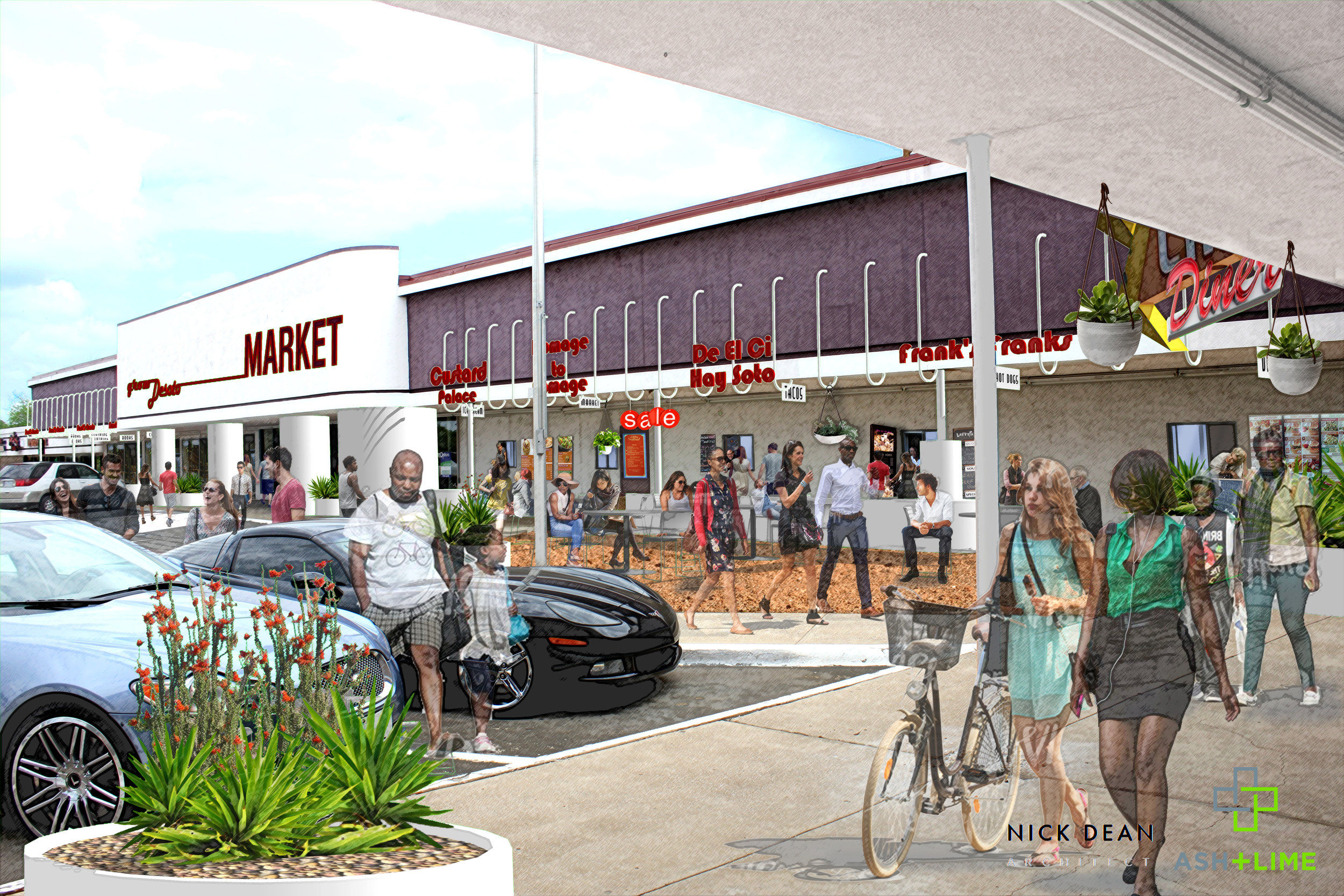Corsicana Historic Spaces and Places
Corsicana, Texas, an hour south of Dallas, is a quintessentially-Texan traditional small town with a rich architectural and cultural heritage. While new businesses and active event venues have led to some revitalization, the large downtown (with seven blocks of high-quality Main Street and about a dozen adjacent commercial blocks) has many empty and abandoned storefronts which limit the downtown’s vibrancy. In addition, the district has long lacked active public gathering spaces, which limits reasons for locals to visit downtown.
ASH+LIME cofounder Amanda Popken brought ASH+LIME as a subcontractor to assist on numerous elements of the project, which is largely a culmination of the unique model developed by the team. The firm provided numerous support services related to public participation, code/ordinance research, media outreach, fundraising, editing, and overall project structure.
The team’s approach was multi-faceted:
● Led extensive outreach to businesses, city staff, elected officials, prospective sponsors, and volunteers
● Recruited and incubated entrepreneurs (12 local businesses for a popup retail program)
● Created temporary active public spaces in underutilized places (beer garden /music area and dog park)
● Consulted with local businesses to advise on overall strategies and coordinate events
● Ran media outreach
● Advised local government officials on the creation of a new window display ordinance
● Coordinated event planning, with musicians, a magic show, walking tours, a ghost investigation, popup art galleries, and various other activations
● Implemented a marketing strategy for for-sale/for lease properties.
In April of 2017, the Corsicana Historic Places and Spaces project served as the culmination of the planning and outreach. Results have included:
● 11 permanent new stores/restaurants within 3 months
● A private donor agreed to fund and maintain dog park
● The beer garden has become a regular monthly public space
● A new window display ordinance was passed, with ASH+LIME’s supporting research
● Consistent Increases of 20-30% in seasonal business over 2016
How it works
While the building and surrounding strip are owned by developer Monte Anderson, the project came to be because of support and subsidies from the DeSoto EDC, which is partly funded by sales tax revenue. Much of the interior renovations were paid for by the EDC, and the corporation master-leases the space from Anderson. Thus far, the EDC has contributed $260,000 to the project, while the city has contributed $125,000. Once the project breaks even, Anderson and the EDC plan to split the profits 50/50.
The north end of the building consists of restaurant spaces, about 420 square feet each, with monthly rents of $1,400. The majority of the vendor stalls in the interior are already occupied by local vendors. These vendor spaces range from 105-305 square feet, and are leased monthly at $350-$750, respectively. There is one larger vendor space of 890 square feet, which is to be leased for $1,750 monthly. The spaces at the rear of the building are occupied by a fitness center and a beauty glamtique. The east side of the building, with its own separate entrance, is designated as a coworking space, including private offices, a conference room, and a resource room. The office spaces range from 50-279 square feet, and are leased monthly at $350-$750.
Each tenant pitched their ideas to the incubator’s management team. If selected, entrepreneurs will join the other marketplace vendors and receive a business space to meet their needs, with affordable rent. This membership also includes resources paid for the DeSoto EDC, including utilities, construction costs, and access to a professional marketing consultant.
With this incubator, the DEDC and Anderson provide the support for local micro-enterprises to thrive on a sturdy foundation, both financial and logistical. The benefit of the incubator marketplace model is that it can offer spaces to entrepreneurs at an affordable rate, without long-term commitments, while consolidating shared services such as operation costs and facilities. It is hoped that once these businesses outgrow their capacity at the marketplace, they can move into larger, more permanent locations in the Hampton Re-Development District, 1.5 miles north of the subject property.
Impacts & Outcomes
Support from the community is key for the success of the marketplace. As the project progresses, Anderson and the DEDC aim to support the project’s tenants and the community, through advertising, business advice, and affordable rent prices.
Many of the marketplace’s tenants are young African-American business owners just starting out. Anderson views it as his responsibility to provide guidance to these local business owners, to help them navigate the institutional intricacies of starting a business.
Citizens of DeSoto are currently spending more in other towns than in their own town. In contrast to the large scale and commercial developments that the DEDC typically works with, the scale and focus of the marketplace are to target the growth of DeSoto by creating local jobs, engaging the community, and keeping the cashflow local, to support unique, local businesses in the town.
The market’s grand opening was on October 20, 2018, the long-term impact of the market is to be seen, the vendor spaces are almost all occupied and budding entrepreneurs are setting up shop. Already, the marketplace has provided the community with something much needed--affordable, healthy plant-based nutrition, from entrepreneur James McGee, who serves smoothies, fruit bowls and specials like jackfruit tacos at his newly opened restaurant Peace. Love. & Eatz, located immediately near the entrance of Grow DeSoto Marketplace. A new event center recently opened at the surrounding strip mall, an addition that may not have happened without the hub created by the marketplace.











